
July 14 – 18, 2024
Marriott Hotel
Casablanca, Morocco
Visa Information and More for your Visit to Morocco
Special Issue announced of new journal Discover Water – Harnessing Nanotechnology: The Convergence for Sustainable Water Solutions.
Poster Presenter Guidelines
Poster dimensions: 1.0 meter wide x 1.5 meter high (portrait style)
Poster Preparation Guidelines [DOC]
About This Conference
After the success of the first and second US-Africa conferences, which were in-person (2019) and virtual (2022) events, convening a third US-Africa conference in-person in Morocco in 2024 will result in solidifying established and creating new connections. This conference will stimulate international collaboration, and contribute to advancing US-STEM (Science, Technology, Engineering, and Math) education, training and research, strengthening these areas.
The overarching goal of this conference is to bring scientists including undergraduate, graduate students, post-doctoral fellows, and faculty together from the United States and African countries to encourage future collaborations through this US-Africa conference. The focus of this 2024 conference is on nanotechnology convergence for sustainable energy, environment, climate change and health.
State-of-the-art research, recent achievements, and global trends in nanotechnology will be presented during the conference to promote cross-disciplinary interactions that can spur the development in these exciting research fields. The conference will stimulate and encourage international collaboration and advance diversity and inclusion. The conference will stimulate engaged group discussions among diverse participants to create transformative ideas that will advance the development of applications in energy, health, and environment. It is expected that the participants will continue communication and create new collaborations following the conclusion of the conference.
The conference will include scientists and engineers from many countries in North Africa including Egypt, Tunisia, Algeria, Morocco, Angola, and Ghana along with participants from other African countries.
The conference will encourage new ideas to improve and revolutionize many technology and industry sectors such as quantum information technology, nanomedicine for cancer therapy and diagnosis, energy harvesting, climate change and environmental science. The agenda of the conference will include opening talks by the co-chairs, followed by keynote speakers and breakout sessions for energy, health, climate change and environment.
Students will present their current research in poster sessions as well as short talks. Presenters will also be sought from industrial and policy sectors. The conference will feature daily open discussions among attendees through short group sessions that includes students, postdocs, and keynote speakers. The main goals of the conference are to use nanotechnology as a convergence platform and a transdisciplinary approach that integrates fundamental science, engineering and medical applications to address global challenges in sustainable energy, environment and health; and to facilitate research collaborations and broader networking among participants.
A significant number of US- students, young and senior scientists (about 40) will attend this conference at little or no cost to the individuals. A Power Hour will be specified/allocated during the last day of the conference for collaborative discussions. Our instructive approach will immerse young scientists in a learning intensive environment with established investigators as a way of educating the next generation of scientists and engineers.
Conference Organization
Co-Chairs
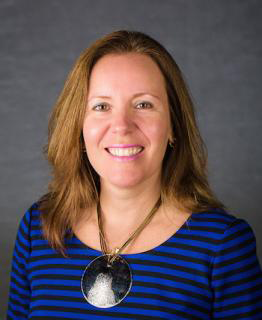
Isabel Escobar
University of Kentucky
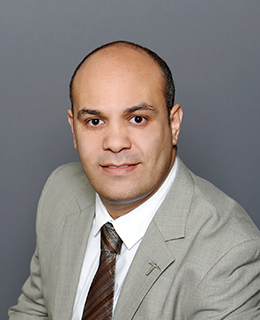
Ahmed El-Gendy
University of Texas-El Paso
Keynote Speakers
Dr. Nora Savage,
Program Director, Engineering Directorate/ CBET
National Science Foundation
Nora currently serves as Program Director for the Nanoscale Interactions Program housed within the Chemical, Bioengineering, Environmental and Transport Systems Division of the Engineering Directorate at the National Science Foundation. Her responsibilities include the management and coordination of technical scientific review panels and management of a grant portfolio of environmental nanotechnology research projects. Nora is one of the Foundation’s representatives on the Nanoscale Science, Engineering and ]Technology (NSET) subcommittee of the National Science and Technology Council that implements and coordinates activities and strategies of the National Nanotechnology Initiative (NNI). She has served as a representative on the NSET since 2001 when she was employed by the U.S. Environmental Protection Agency.
Nora has worked for the U.S. federal government for over twenty years. In this capacity she has served the environmental nanotechnology and the general environmental engineering research communities through her contributions to strategic research direction. Nora has authored and co-authored numerous articles on nanotechnology and emerging technologies in leading journals. She is committed to increasing diversity in science and engineering fields. The pathway towards achieving a sustainable, healthy, and peaceful world lies in the involvement of, dialogue with and inclusion of all members of our global society.
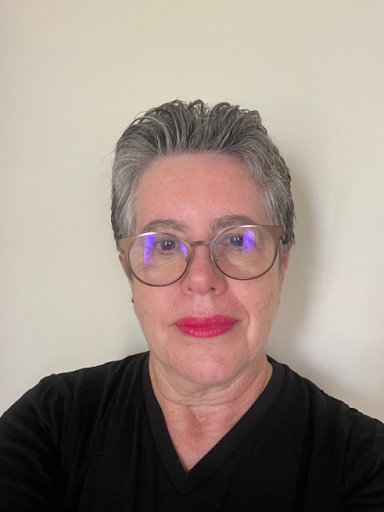
Suzana Nunes
Suzana Nunes is the Vice Provost for Faculty and Academic Affairs at KAUST, where she is a Professor of Chemical and Environmental Science and Engineering. She has a PhD in Chemistry from the University of Campinas, Brazil, was a Humboldt postdoc Fellow in polymer physical chemistry at the Johannes Gutenberg University, Mainz, Germany, and visiting scientist at the Max-Planck for Polymer Science and Tokyo Institute of Technology. She is a Fellow of the Royal Society of Chemistry, UK, and of the Sao Paulo Academy of Science, Brazil. She is the laureate of the 2023 L’Oreal-UNESCO for Women in Science International Award for Africa and the Arab States recognized for her achievements in chemistry. She is an Associate Editor of ACS Applied Polymer Materials and a member of the Journal of Membrane Science board. She has decades of experience in polymeric membrane development with more than 290 publications in the field, 7 books, and several patents. In Germany, she was head of the department of membranes for sustainable energy at Helmholtz Association, having led strategic German and European projects on hydrogen technology and CO2 capture. At KAUST, her lab focuses on new polymeric materials, and their translation into membranes for liquid, gas, and vapor separations. She targets sustainable separations that would enable less energy-intensive processes in the chemical, petrochemical, and pharmaceutical industries. For this purpose, highly stable materials are required. Her group also explores green solvent alternatives for membrane preparation, considering polymers from non-fossil sources and methods that permit the recycling and polymeric materials and circular chemistry applied to membrane fabrication.
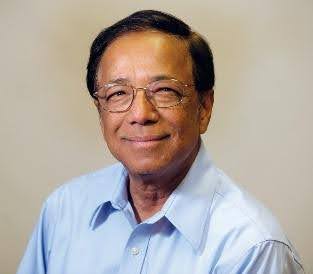
Prof. Dibakar Bhattacharyya
Prof. Dibakar Bhattacharyya (DB) is the University of Kentucky Alumni Chair Professor of Chemical Engineering, Director of the UK Center of Membrane Sciences, and a Fellow of AIChE and North American Membrane Society. In 2023, he was the recipient of the North American Membrane Society Alan S. Michaels Award for Innovation in Membrane Science and Technology. He received his Ph.D. from the Illinois Institute of Technology, M.S. from Northwestern University, and B.S. from Jadavpur University. He was also the past President of North American Membrane Society, and the past Chair of the AICHE Separations Division. DB has also spent several months (in person) in a membrane company dealing with synthesis and production scale manufacturing of advanced nanofiltration and functionalized membranes with nano-catalyst domain. In addition, DB and his group have done extensive nanotechnology integrated membrane filtration and sustainable water detoxification technology development and collaborative research work with several companies, and also with Singapore SMTC and START. He has published over 245 refereed journal articles, books, and book chapters. He and his students have 10 (and one pending) US patents in membrane filtration and environmental area. Dr. Bhattacharyya has received a number of awards for his research and educational accomplishments, including the 2021 SEC Faculty Achievement Award, 2020 AICHE (Sep div) Founders Award, 2018 Sturgill Award for graduate research and education, 2009 Gerhold award on Separations technology from AICHE, 2004 Kirwan Prize for Outstanding Research, 1989 Larry K. Cecil AIChE Environmental Division Award on water treatment technology developments, the Kentucky Academy of Sciences Distinguished Scientist Award, AIChE Outstanding Student Chapter Counselor Awards, and the University of Kentucky Great Teacher (1984,1996, 2008, and 2022) Awards.

Jacob Jones (Professor of Materials Science and Engineering, North Carolina State University and Director, Science and Technologies for Phosphorus Sustainability (STEPS) Center)
Leveraging Nanotechnology Applications to Address Climate Change
The NNI community is working to mobilize the field in the United States and abroad to connect nanotechnology with climate and sustainability solutions. For example, the U.S.’s Nano4EARTH National Nanotechnology Challenge has highlighted the opportunity space in greenhouse gas capture, for interface technologies, energy storage, and catalysts for nanoscale solutions. Professor Jones will address these and other efforts and the technical areas at the intersection of nanotechnology and climate change.
Jacob Jones is a Kobe Steel Distinguished Professor of Materials Science and Engineering at North Carolina State University (NCSU). Professor Jones is also the Director of the Science and Technologies for Phosphorus Sustainability (STEPS) Center, and Principal Investigator of the Research Triangle Nanotechnology Network. His\ research interests involve developing structure-property-processing relationships in emerging functional materials, primarily through the use of advanced X-ray and neutron scattering tools. He has been an advocate for, and supported, international science and engineering initiatives.
Professor Jones is a Fellow of the IEEE Society and the American Ceramic Society. Jones received his Ph.D. from Purdue University in 2004. He was an Assistant and Associate Professor in the Department of MSE at the University of Florida from 2006-2013 and joined NCSU in August of 2013.

Branden Brough (Director, NNCO)
The U.S. 21st Century Nanotechnology Research and Development Act at 21
In the two decades since the authorization of the 21st Nanotechnology Research & Development Act, the NNI has served as a model of an intentional, whole-of-government approach for nanotechnology commercialization applied towards achieving national priorities. This talk provides an overview of the important elements in the NNI’s strategy that have been central to its success and adaptability for the evolving nanotechnology landscape.
Branden Brough joined the National Nanotechnology Coordination Office (NNCO) as Director in September 2022. He also serves as the Assistant Director for Nanotechnology at the White House Office of Science and Technology Policy. Prior to his appointment as NNCO Director, Dr. Brough was Deputy Director of the Molecular Foundry, a U.S. Department of Energy-funded nanoscale science research center that provides users from around the world with access to cutting-edge expertise and instrumentation.
Before joining the Molecular Foundry, Dr. Brough worked at the NIH’s National Institute of Arthritis and Musculoskeletal and Skin Diseases, where he led strategic policy and planning activities, as well as Congressional and public outreach efforts. Dr. Brough received his Ph.D. in Mechanical Engineering – focusing on the integration of synthetic motor molecules and natural self-assembling proteins into micro/nanotechnologies – from the University of California, Los Angeles (UCLA) before becoming an American Association for the Advancement of Science (AAAS) Science and Technology Policy Fellow in 2007.
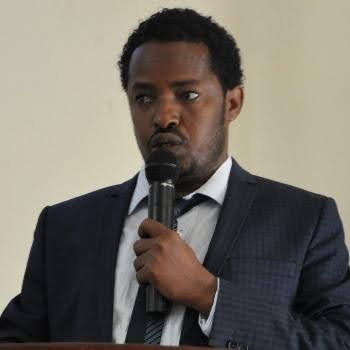
Dr. Haftu Alemayehu, Arba Minch University, National Center for Nanoscience and Technology, Ethiopia
Mild temperature regulated highly stable graphene oxide membrane for molecular separation
Dr. Haftu Alemayehu received his B.S. degree in Applied Chemistry from Arba Minch University and his Ph.D. in Physical Chemistry from the National Center for Nanoscience and Technology, University of Chinese Academy of Science (China). He is currently an Assistant Professor of Physical Chemistry in the Department of Chemistry at Arba Minch University, Ethiopia. Dr. Alemayehu’s research focuses on developing 2D porous nanomaterials-based membranes for applications in water treatment, desalination, nanofiltration, organic solvent separation, and gas separation. He has published numerous articles in peer-reviewed journals and presented his research at many international conferences. In addition to his research, Dr. Alemayehu is experienced in teaching and mentoring undergraduate and graduate students. He has taught courses such as Electrochemistry, Surface Chemistry and Catalysis, Chemical Kinetics, Quantum Chemistry, and Nanoscience and Technology, and has supervised numerous graduate and postgraduate students.
He serves as the Head of the Research Coordination Office of the College of Natural Sciences at Arba Minch University. He is also the founder, editorial manager, and an editorial board member of the Omo International Journal of Science. Dr. Alemayehu has received several awards and recognitions, including the 2022 UCAS Excellent International Student Award, Young Visiting Scholar, and UCAS PhD Scholarship Award. He is an active member of professional organizations such as the African Membrane Society and the Ethiopian Chemical Society.
Conference Program
Outstanding Poster Awards
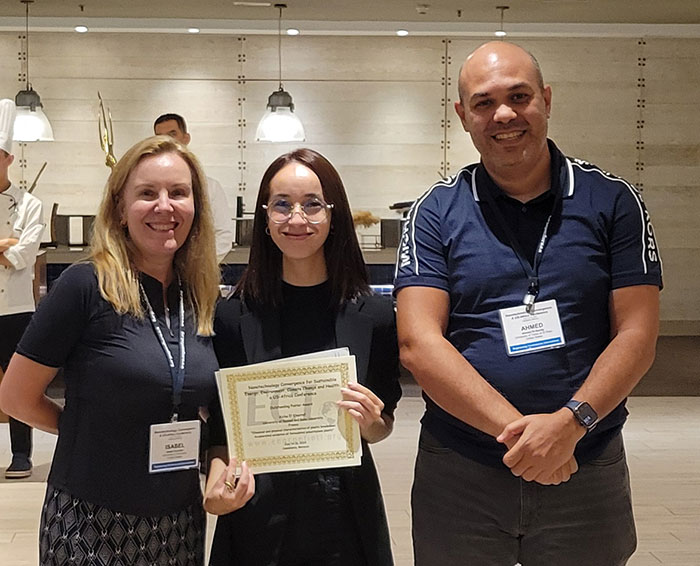
Aicha El Kharraf
University of Rennes and Duke University, France
“Chemical and physical characterization of plastic breakdown: Accelerated oxidation of formulated polyethylene plastic”
Mariam Elabbasi
University of Texas at El Paso, USA
“Smart Nanomagnets for Hyperthermia Cancer Therapy: In vitro and in vivo studies for breast, prostate tumor models”
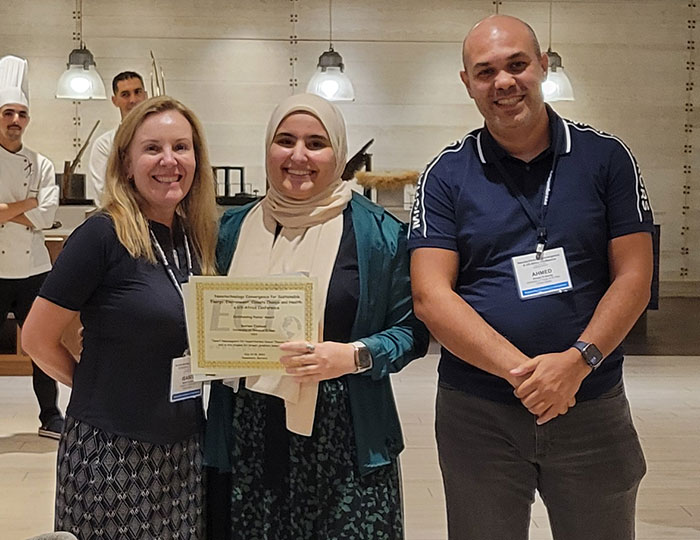
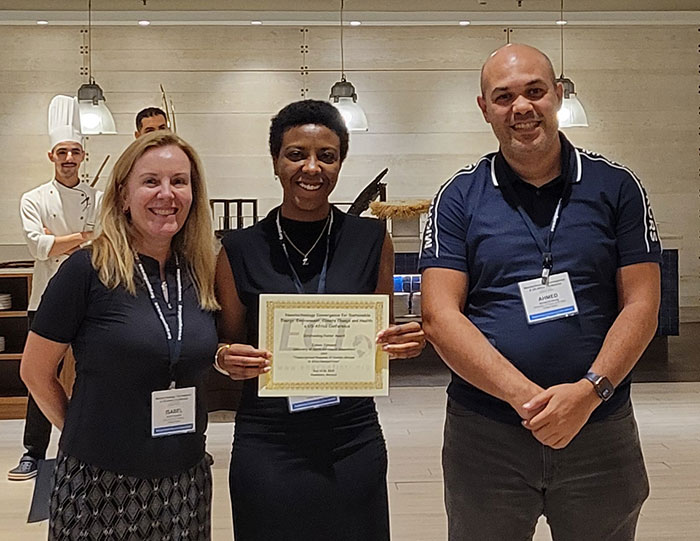
Zelena Johnson
University of North Carolina at Greensboro, USA
“Transcriptional Response of Candida albicans to Silica Nanoparticles”
Conference Fees and Registration
The conference fee includes the following: Conference registration, accommodations (nights of Sunday (July 14), Monday (July 15), Tuesday (July 16), and Wednesday (July 17); check-out on Thursday (July 18)), meals (with the exception of Monday and Tuesday dinners), coffee breaks and excursion on Wednesday. Dinners on Monday and Tuesday are on your own so that you can explore the variety of cuisines in Casablanca. Incidental fees (laundry, minibar etc.) are billed to your personal account by the hotel.
ALL PARTICIPANTS (INCLUDING MEMBERS OF THE ORGANIZING COMMITTEE AND INVITED SPEAKERS) ARE REQUIRED TO REGISTER.
The conference fees are:
| Register on or before June 20, 2024 | Register after June 20, 2024 | |
| Participant (single occupancy or sharing room with a guest; guest fee additional) | US $2415.00 | US $2615.00 |
| Participant (sharing a room with another participant) | US $2180.00 | US $2380.00 |
| Bona fide Graduate Student (sharing a room with another student) (Those in this category must upload proof of current status during registration – copy of current Student ID or a letter from your University confirming your student status) | US $1500.00 | US $1600.00 |
| Bona fide Graduate Student (single occupancy or sharing room with a guest; guest fee additional) (Those in this category must upload proof of current status during registration – copy of current Student ID or a letter from your University confirming your student status) | US $1735.00 | US $1835.00 |
| **Fees for Guest/accompanying person sharing bedroom with a participant. (Includes all conference included meals and excursion) Guests/accompanying persons may not attend technical sessions. | US $950.00 | US $950.00 |
| **Fees for Guest/accompanying person sharing bedroom with a participant. (Bed & Breakfast ONLY, NO meals and NO excursion) Guests/accompanying persons may not attend technical sessions. | US $225.00 | US $225.00 |
If you plan to bring children under the age of 12 to the conference, please contact Renee Smith for pricing. Children who are 12 and up are considered adults by the hotel. The hotel allows only one child per room.
If you are an African national (Those in this category must upload proof of current legal status (e.g., copy of passport) during registration, please contact Renee Smith prior to registering..
Special Notes and Payment Instructions
We suggest that you register as soon as possible to be certain that you will have a hotel room at the conference rate.
All participants are encouraged to register before June 20, 2024. There is a discounted price for registering before this date. Hotel space cannot be guaranteed for registrations received after this date. Your registration is not officially confirmed until we receive payment of the amount due. ECI reserves the right to cancel your room registration if payment is not received or your vaccination proof is invalid. Your invoice/receipt will automatically be e-mailed upon of receipt of your registration. Should you need a signed receipt, please contact Renee Smith.
Because of contractual guarantees made with the hotel for room and meal functions, no shows, late arrivals, missed meals and early departures cannot receive fee adjustments. If you have a disability and may require accommodation in order to participate fully in this conference, please indicate this when you register. An ECI representative will contact you to discuss your specific needs. If you have special dietary requirements (e.g., vegetarian or a food allergy), please make a note on your registration. The chef needs to know this information in advance if we are to accommodate you. ECI will attempt to accommodate special requests such as Kosher or Halal meals, but such meals may not be available at all conference sites. The participant must pay any additional costs for special meal requests that ECI pays a surcharge for.
Payment must be made by credit card (Visa, MasterCard, and Amex), check or money order drawn on a U.S. bank in U.S. dollars, payable to ENGINEERING CONFERENCES INTERNATIONAL. Checks or money orders in any other currencies are NOT ACCEPTABLE. Payment must be made on the web site except for those who are sending payment by wire transfer or have a purchase order from their company/institution.
WIRE TRANSFER PAYMENT: If you are planning to make payment by wire transfer, please contact Renee Smith for the bank information. You must add $30 to cover ECI bank charges. Please reference your full name and the conference title. Please email a scanned copy to Renee Smith. This is very important – otherwise it is extremely difficult to trace your payment and you may not receive a receipt prior to the conference.
Cancellation Policy: Cancellation must be received by ECI in writing at least 28 days prior to the start of the conference in order for a full refund (less a processing fee) to be considered. The ECI auditors require that refunds for all conference cancellations be processed after the conference so that the necessary back-up information (e.g., hotel list of those in-house) can be attached to the refund request and ECI can verify that the hotel has not charged a cancellation fee.
Cancellation fees:
- Cancellations received more than 28 days prior to the conference start date are subject to a processing fee of 4% of the total fee, plus any direct expenses incurred by ECI.
- Cancellations received 15 – 28 days prior to the conference start date are subject to a $250 cancellation fee plus any direct expenses incurred by ECI.
- Cancellations received 8 – 14 days prior to the conference start date are subject to a $500 cancellation fee plus any direct expenses incurred by ECI.
- No refunds will be issued for cancellations received fewer than 7 days prior to the conference start date.
- No refunds will be issued due to inclement weather or travel disruptions/cancellations.
Registrations may be transferred without incurring any penalty or cancellation fee.
Denied or delayed visa
If a participant is forced to cancel due to a denied or delayed entry visa, ECI will issue a full refund if ECI has been notified of a potential visa issue at least four weeks prior to the conference start date.
Change of payment method
If an attendee who has already paid the conference fee with a credit card requests that the fee be refunded to that card so that it can be paid in a different manner (e.g., charged to an alternate credit card, or paid via check or bank transfer), a processing fee of 4% of the total fee amount will apply.
Disclaimer
It may be necessary for reasons beyond the control of ECI to alter the content and timing of the program or the identity of the speakers. In the unfortunate circumstance that an event is cancelled, ECI is not liable for any costs incurred by participants in connection with their attendance.
Smoking is prohibited at ECI conferences and conference functions.
Should you have specific questions regarding your registration, please contact Renee Smith.
Call for Abstracts
Session titles are listed in the Tentative Agenda. Please use this information to pre-select up to three sessions where you believe your work fits best.
Abstracts (one page maximum) that include specific results and conclusions to allow a scientific assessment of the proposed oral presentation are invited.
Abstracts must be submitted electronically and prepared according to this template: docx or doc.
Oral abstract submission deadline: May 31, 2024
Poster abstract submission deadline: May 31, 2024
Abstracts of all presentations will be made available to conference participants prior to the start of the conference.
Awards will be presented to the top three student posters
Note: Only a limited number of oral presentation slots are available and thus all submissions for oral sessions will be considered for both oral and poster presentation.
Pre- and Post-Reservation
Venue Information
A rich country in long-standing culture, Morocco is home to generations of vibrant preserved traditions. Every festival, ritual or special gathering is a symbol of the living arts in the country. Casablanca is, however, also the center of contemporary Moroccan culture with cosmopolitan restaurants, theaters and galleries.
Hotel and Transportation Information
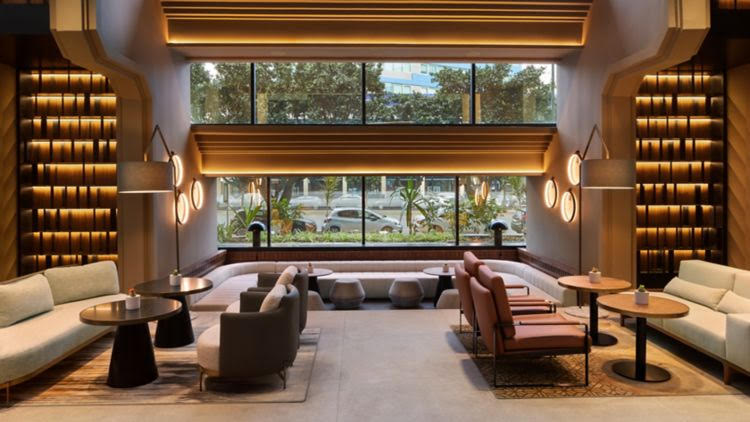
The conference will take place at the Casablanca Marriott Hotel, a 5-star hotel ideally located in the heart of the historic “Art Deco” district in the city center of Casablanca, 40 minutes away from the international airport, 10 minutes walking distance from Casa Port fast train station, restaurants and main tourist attractions. The hotel features a plethora of facilities including fast and reliable internet, pool, hot tub, a business center, fitness center, TV, laundry service and free parking. The service is warm and welcoming and the guest rooms are contemporary. Their BaB restaurant features both international and Moroccan all-day dining. In addition, there is a coffee shop and a cocktail bar. Their meeting facilities are among the finest in Morocco. The hotel is 3 km from the Hassan II Mosque.
Hotel Information
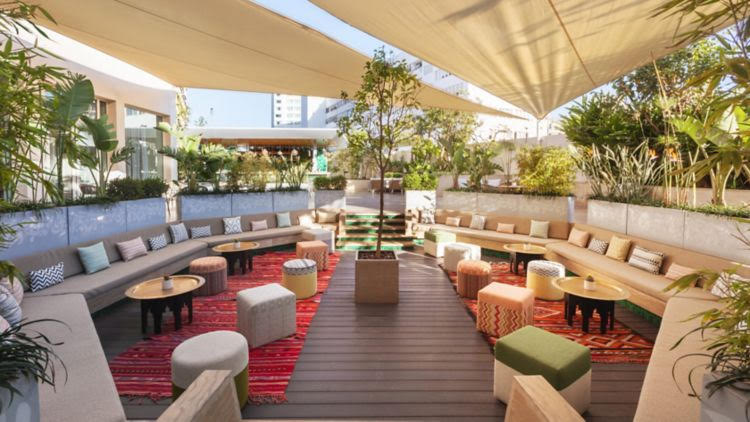
Casablanca Marriott Hotel (100 Av. Des FAR, Casablanca-Settat 20 000) Phone: +212-522-439494
Note that hotel check-in is at 3 pm and check-out is at noon.
Transportation From Mohammed V International Airport
The airport is located approximately 40-45 minutes (30 km) from the Casablanca Marriott Hotel. Passage through Moroccan Customs takes place at the exit of the baggage delivery area. Use the green circuit if you are not carrying any goods to be declared. The Arrival Hall has an information desk, exchange offices and banking services, cafes and restaurants.
The taxi station is located at the Arrival esplanade. The cost should be approximately 20-25 MAD. Taxis do not take credit cards and so we recommend changing currency at the airport before taking a taxi. Note that Ubers are not available in Casablanca.
Another alternative is to contact the hotel prior to your departure for Morocco where the concierge (Mustapha Rahy) can assist with booking you a car service. (mostafa.rahy@marriottcasablanca.com)
One can also pre-book an individual or group taxi through GetTransfer.com; however, this is not an endorsement but informational only.
Another alternative: there is a train station at the airport and one can take a train to Casa Voyageur (the main train station in Casablanca) and then take a taxi to the hotel.
Casablanca
Casablanca, which sits on the Atlantic Ocean, is Morocco’s largest city and main port. It is Morocco’s largest economic powerhouse and transportation hub. Its skyline is dominated by the Hassan II Mosque which has the world’s tallest minaret and can host 25,000 worshippers inside as well as a further 80,000 in its courtyard. Thanks to the moderating effect of the Atlantic’s cool Canary Current, the city enjoys a Mediterranean climate and its climate and temperature range is often compared to that of coastal Los Angeles.
Its main airport, Mohammed V International Airport (CMN) is three miles northeast of the city center and has direct transportation (less than seven hours) from New York on Royal Air Maroc. There are flights from more than 96 international destinations.
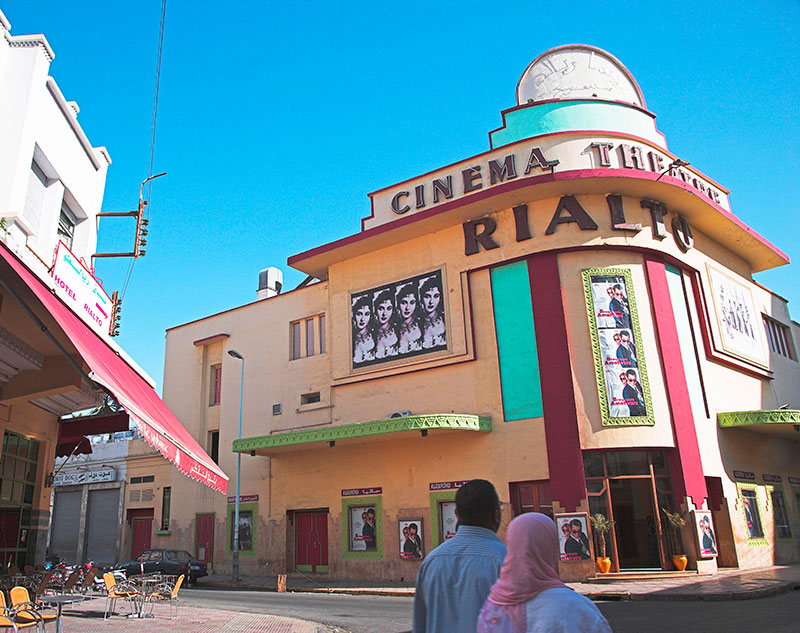
Casablanca boasts the most Art Deco architecture of all Moroccan cities which gives the city more of a fresh, modern feel in contrast to the imperial cities. The Art Deco buildings are a reminder of the French colonial period. Many of the buildings in Casablanca are unique in that they blend traditional Moroccan designs with European architecture. (The movement became known as Mauresque). No artists are creating more spaces throughout the city to showcase their work as they convert miscellaneous buildings to galleries.
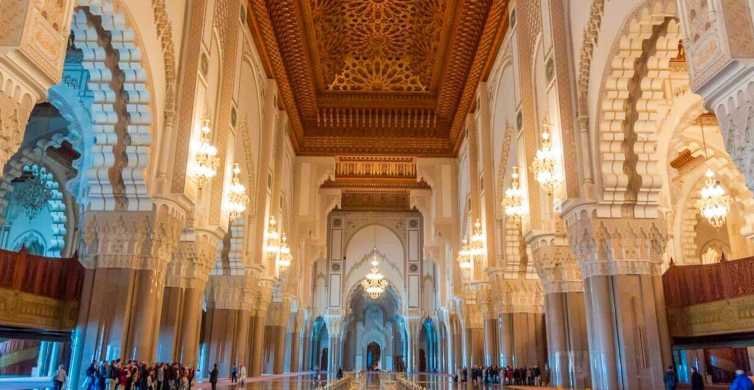
The Hasan II Mosque is the city’s most well-known attraction and should not be missed. Visitors who want to understand Islam and desire to visit an Islamic house of worship should visit this mosque which features traditional Moroccan materials and architectural styles and provides an unparalleled glimpse into the major faith of the country and its traditions. Tours are available.
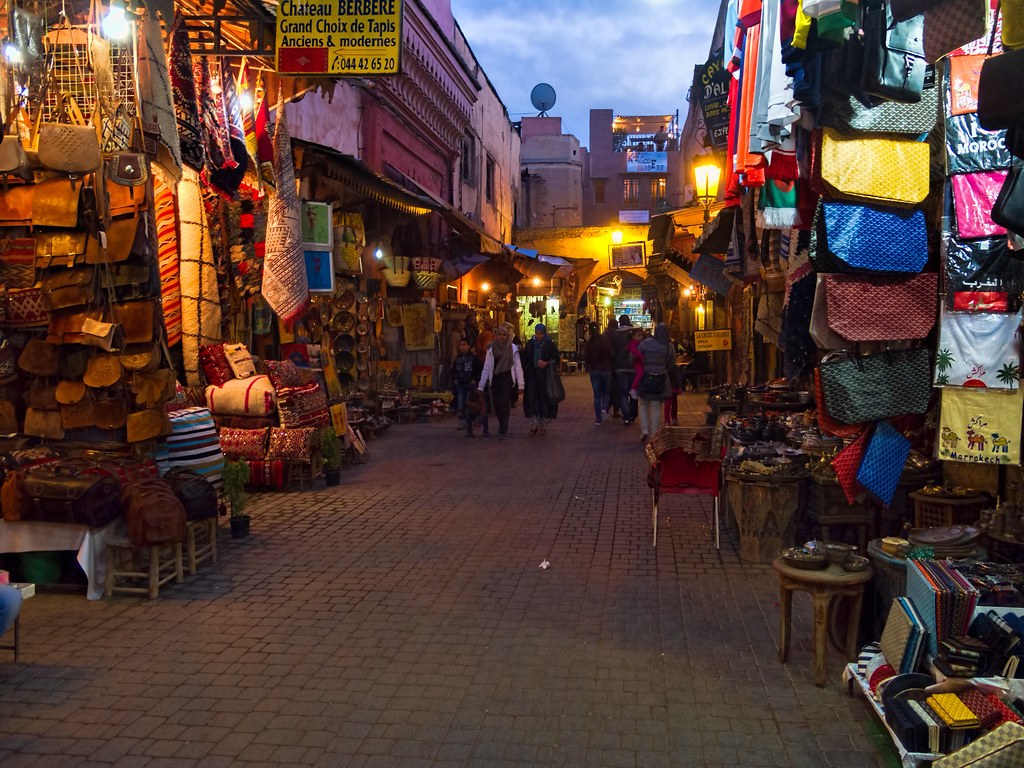
To get an immersive experience in both Moroccan culture and traditions, visit the medinas to observe the hidden details of Moroccan daily life. While many medinas date far back in history, the old medina of Casablanca dates just to the 19th century. While large parts are residential, the entrance near Bab Marrakech and Plaza des Nations Unites feature more artisan and food goods such as local cured olives and handmade goods like rugs, metalwork and pottery. The area is a honeycomb of interwoven streets and the area typically abounds with donkeys, water sellers, and seasonal fruit and vegetables piled high on carts.
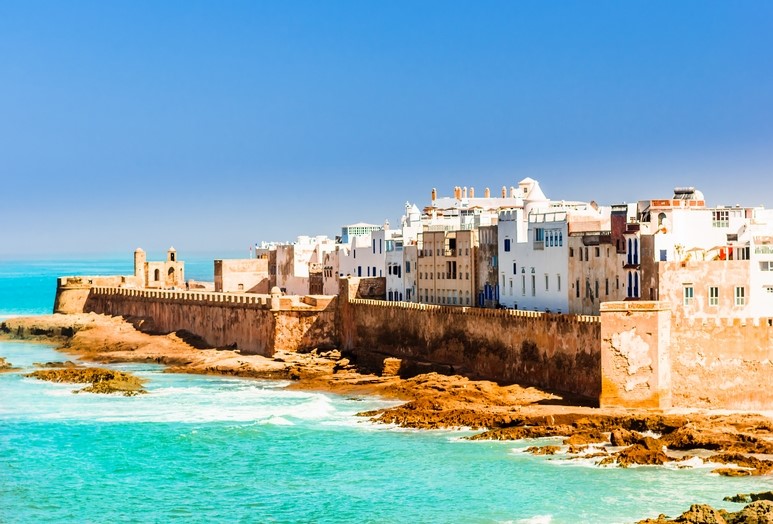
As Casablanca is along the coast, it has a corniche that stretches along the coast and is a perfect place for many to stroll along the promenade and enjoy views of the seaside.
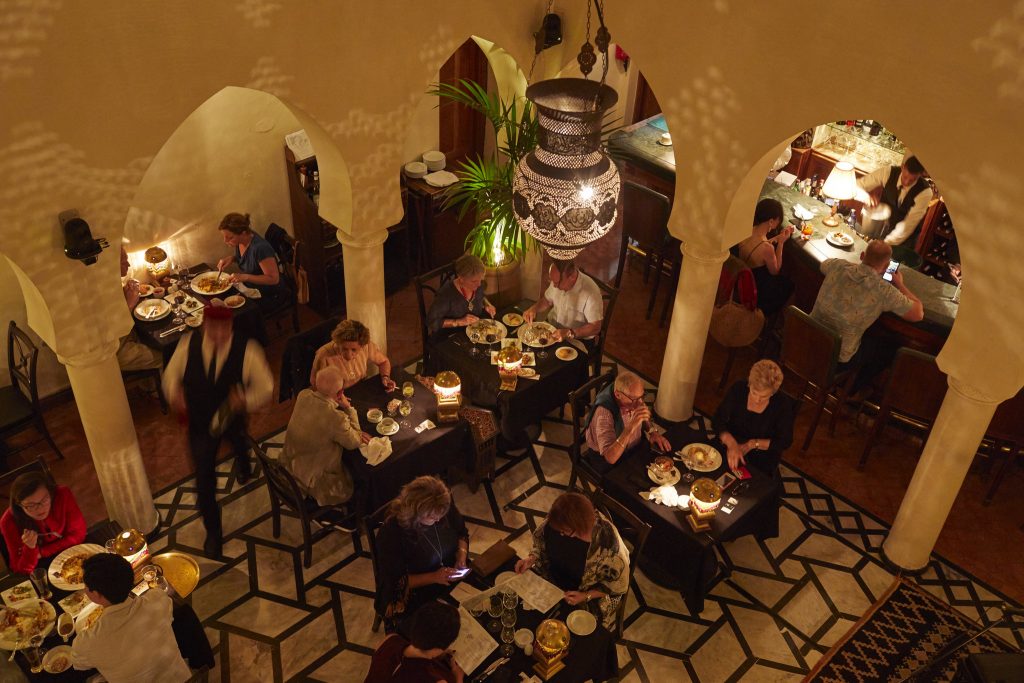
Movie fans will enjoy having a meal at Rick’s Café, a restaurant that recalls the Academy Award winning movie, Casablanca.
Casablanca is not without a modern shopping mall, one of the largest in Africa. In a futuristic style, it overlooks the coast. It contains an aquarium as well as many restaurants in addition to a wide variety of shops.

The city is home to an extensive number of diverse restaurants in all price ranges. Traditional Moroccan dishes join those meals that reflect the nation’s French and Spanish legacies as well as restaurants that feature Italian, Japanese, Lebanese and Chinese cuisines.
Planning Your Visit:
- Language: There are two official languages: Standard Arabic and Tamazight (Berber). The most commonly spoken European language is French, although many people speak some English.
- Currency: Moroccan dirham (For current conversion rates, check a currency converter on your browser.)
- Transportation: The Casa Tramway offers a convenient, efficient, and affordable way to get around Casablanca. If the tram’s two lines don’t cover your chosen destination, private taxis (petit taxis in Morocco) are a helpful alternative. Make certain your taxi has a working meter. Note that taxi fares increase by 50% after 8 pm.
- Classic Moroccan dishes include tagine (a rich stew of meat and vegetables, flavored with spices, nuts, and dried fruit), couscous, and pastilla (a savory pie made from meat wrapped in layers of paper-thin pastry. Note though that Casablanca is known for its excellent seafood. Street stalls and local restaurants charge a fraction of the price compared to international restaurants that are geared to tourists.
- Alcohol: You will be able to order imported beer, wine and spirits at most international restaurants and upscale hotels. Traditional Moroccan restaurants usually don’t serve alcohol for religious reasons. There are many delicious alcohol-free alternatives. One should not leave Casablanca without trying the mint tea.
- The Habous Quarter is great for shopping. Remember that the initial prices are usually twice what you are expected to pay and you should hone your haggling talents.
- Clothing: Dress conservatively in clothes that cover the shoulders and knees.
General Information about ECI
Engineering Conferences International (ECI) is a not-for-profit, global engineering conferences program, originally established in 1962 that provides opportunities for the exploration of problems and issues of concern to engineers and scientists from many disciplines.
The format of the conference provides morning and late afternoon or evening sessions in which major presentations are made. Poster sessions will be scheduled for evening discussion as well. Available time is included during the afternoons for ad hoc meetings, informal discussions, and/or recreation. This format is designed to enhance rapport among participants and promote dialogue on the development of the meeting. We believe the conferences have been instrumental in generating ideas and disseminating information to a greater extent than is possible through more conventional forums.
All participants are expected both to attend the entire conference and to contribute actively to the discussions. The recording/photographing of lectures and presentations is forbidden. As ECI conferences take place in an informal atmosphere, casual clothing is the usual attire.
Smoking is prohibited at ECI conferences and conference functions.

